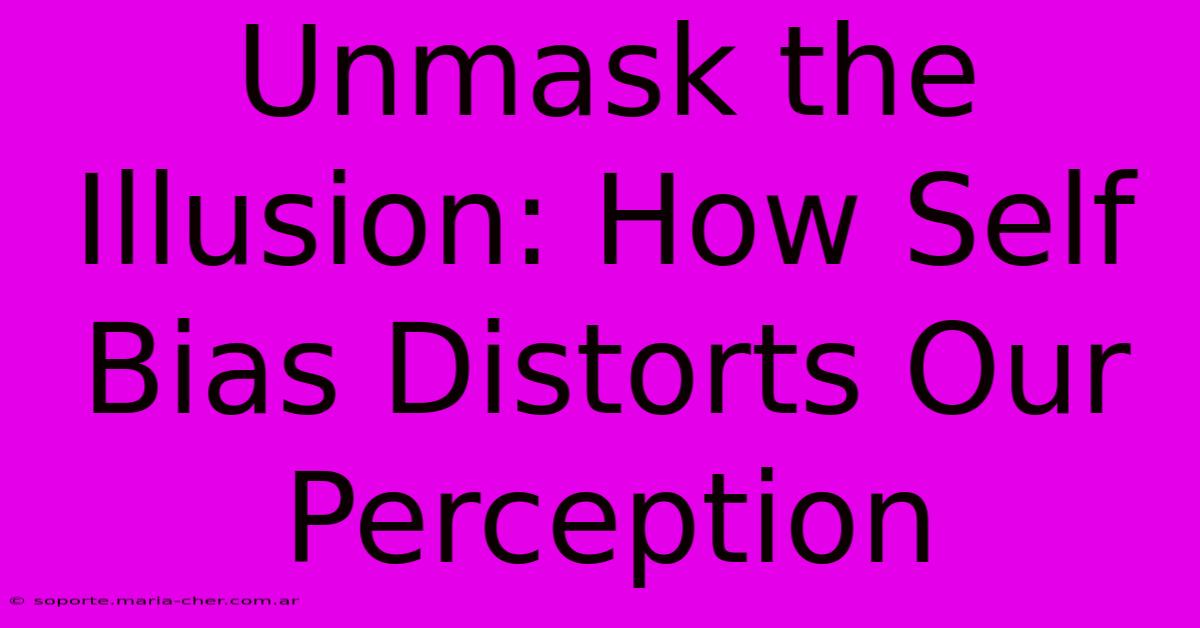Unmask The Illusion: How Self Bias Distorts Our Perception

Table of Contents
Unmask the Illusion: How Self-Bias Distorts Our Perception
We all like to think of ourselves as objective, rational beings. We believe we see the world as it is, making decisions based on unbiased facts and logic. But the reality is far more complex. Our perception is constantly shaped by a powerful force: self-bias. This article will delve into the fascinating, and often frustrating, ways self-bias distorts our perception of ourselves, others, and the world around us.
Understanding Self-Bias: The Root of Distortion
Self-bias, also known as egocentric bias, is a cognitive bias where we tend to perceive ourselves in a more positive light than others. This isn't necessarily a conscious act of deception; it's a deeply ingrained psychological mechanism that influences our thinking and behavior in subtle yet significant ways. Several key components contribute to this distortion:
1. The Better-Than-Average Effect:
This common phenomenon sees most people rating themselves as above average in various desirable traits, skills, and abilities. Whether it's driving skills, intelligence, or even moral character, we tend to inflate our self-perception, leading to an inaccurate assessment of our capabilities. This bias can hinder self-improvement and lead to unrealistic expectations.
2. Self-Serving Bias:
This bias attributes positive outcomes to our own abilities and efforts (internal attribution), while blaming external factors for negative outcomes (external attribution). For example, succeeding on a test is attributed to our intelligence and hard work, while failing is blamed on a poorly written exam or the teacher's unfair grading. This protects our self-esteem but prevents us from learning from our mistakes.
3. Confirmation Bias:
We tend to seek out and interpret information that confirms our existing beliefs about ourselves, while ignoring or dismissing evidence that contradicts them. This reinforces our self-image, even if that image is inaccurate. For instance, if we believe we're a great public speaker, we might focus on the positive feedback while downplaying any criticisms.
4. The Illusion of Control:
This bias refers to our tendency to overestimate our ability to control events, even those beyond our influence. This can lead to risky behavior and unrealistic expectations, especially in situations involving chance or uncertainty.
The Impact of Self-Bias: Ripple Effects on Life
The consequences of self-bias extend far beyond simply having an inflated ego. It significantly impacts various aspects of our lives:
-
Relationships: Self-bias can strain relationships by creating misunderstandings, fueling conflicts, and hindering effective communication. Overly positive self-perception can lead to a lack of empathy and difficulty acknowledging others' perspectives.
-
Decision-Making: Unrealistic self-assessments can lead to poor decision-making, as we might underestimate risks or overestimate our abilities to handle challenges. This can have serious consequences in various areas, from career choices to financial decisions.
-
Personal Growth: Self-bias impedes personal growth by hindering our ability to identify weaknesses and areas for improvement. We may avoid constructive criticism or fail to recognize opportunities for learning and development.
-
Professional Life: In the workplace, self-bias can affect performance evaluations, team dynamics, and career advancement. Overconfidence can lead to mistakes and missed opportunities, while a lack of self-awareness can prevent us from seeking necessary feedback and support.
Overcoming Self-Bias: Towards a More Realistic Self-Perception
Recognizing and mitigating the effects of self-bias is crucial for personal and professional growth. Here are some strategies to cultivate a more realistic self-perception:
-
Seek Feedback: Actively solicit feedback from trusted sources, even if it's critical. Focus on understanding the message, not on defending your ego.
-
Practice Self-Reflection: Regularly examine your thoughts, feelings, and behaviors. Journaling can be a valuable tool for this process.
-
Embrace Failure: View failures as learning opportunities, focusing on what you can learn from mistakes rather than dwelling on the negative emotions.
-
Develop Self-Compassion: Treat yourself with the same kindness and understanding you would offer a friend facing similar challenges.
-
Cultivate Objectivity: Strive to view situations from multiple perspectives, considering others' points of view and acknowledging their validity.
Self-bias is a powerful force that subtly shapes our perception, but by understanding its mechanisms and employing the strategies outlined above, we can unmask its illusion and cultivate a more realistic and balanced view of ourselves and the world. This journey towards self-awareness is not easy, but the rewards—improved relationships, better decision-making, and enhanced personal growth—are well worth the effort.

Thank you for visiting our website wich cover about Unmask The Illusion: How Self Bias Distorts Our Perception. We hope the information provided has been useful to you. Feel free to contact us if you have any questions or need further assistance. See you next time and dont miss to bookmark.
Featured Posts
-
Worshipped
Feb 04, 2025
-
Shrink Proof Polyester The Holy Grail Revealed
Feb 04, 2025
-
Worshiped
Feb 04, 2025
-
Journey Through Time Uncovering The Morgan Librarys Hidden Treasures
Feb 04, 2025
-
Rgb Masterclass For Silver Blue Elevate Your Visuals To The Next Dimension
Feb 04, 2025
